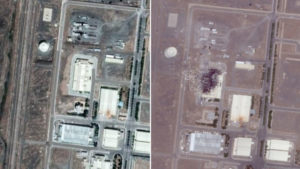Israel just bombed Iran. And no one noticed.
On July 2, 2020, two explosions erupted in Iran, and both seem to have been ignited by Israel. Neither explosion attracted much reporting, and what reporting there has been remains thin and confused.
The first report came out on the afternoon of July 3. The Jerusalem Post picked up a story from Kuwait’s Al-Jarida, reporting that a fire had broken out at Iran’s civilian Natanz nuclear enrichment site. The Kuwaiti report says that an unnamed senior source informed them that the fire was caused by an Israeli cyber attack. They suggest that Iran will need about two months to recover from the attack. Iranian officials have since confirmed that, though none of the underground centrifuges were damaged, the above ground damage is extensive, and that their centrifuge program has been substantially set back.
The second attack exploded near Parchin, at a site claimed to be a missile production facility. Citing the same Kuwaiti paper, The Times of Israel attributed the Parchin explosion to missiles dropped by Israeli F-35 stealth fighters.
The Parchin story has drawn little further attention and remains undeveloped, but the Natanz story has confusingly evolved. Though unnamed Iranian officials seemed at first to side with the cyber attack theory, some experts sided with a different theory: that the Natanz explosion was not a cyber attack but an actual, bolder physical attack. In a rare piece of mainstream reporting, The New York Times seems to confirm the physical attack theory. Relying on a “Middle Eastern intelligence official with knowledge of the episode,” the Times reports that the Natanz nuclear complex was not hit by a cyber attack, as it has been previously, but by a “powerful bomb.” The intelligence official added that “Israel was responsible for the attack.” The Times report supports the intelligence source by adding that a “member of the Islamic Revolutionary Guards Corps who was briefed on the matter also said an explosive was used.” According to the Revolutionary Guards source, it is likely that someone carried the bomb into the building.
These two attacks seem to add dropping missiles from the sky and walking bombs in on the ground to Israel’s resume of acts of war on Iran. And the resume is long.
Cyber Attacks
Though Israel did not hit the Natanz facility with a cyber attack this time, it has hit it with a serious cyber attack in the past. In the past operation, Israel partnered with the United States, specifically Israel’s secret military unit 8200 partnered with the American CIA and NSA.
When a massive virus called Flame was injected into Iranian computers, it mapped and monitored the system of Iranian computers and sent intelligence back that was used to prepare for cyber war campaigns against Iran. Officials have confirmed that Flame is one part of a joint project of the CIA, NSA and unit 8200.
One of the cyber wars that Flame prepared the way for is the now famous Stuxnet. Stuxnet was a computer virus that infected Iran’s centrifuges and sent them spinning wildly out of control before playing back previously recorded tapes of normal operations that plant operators watched unsuspectingly while the centrifuges spun faster and faster until they literally tore themselves apart. The New York Times says that, according to intelligence and military experts, the Dimona nuclear complex in Israel was the testing ground for the virus. There are nuclear centrifuges in Dimona that are virtually identical to Iran’s, making it a perfect model to test the effectiveness of the virus. Stuxnet seems to have wiped out about 20% of Iran’s nuclear centrifuges.
So that puts missile attacks, bomb attacks and cyber attacks on the Israeli resume of acts of war on Iran. And the cyber attack was an act of war. A NATO study has admitted that Stuxnet qualified as an “illegal act of force.” According to Stephen Cohen, after the U.S. accused Russia of hacking computers, NATO issued a statement saying that “hacking a member state might now be regarded as war against the entire military alliance, requiring military retaliation.”

